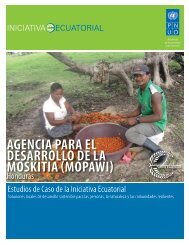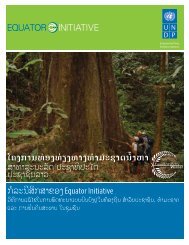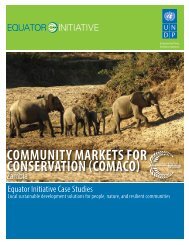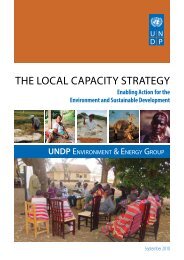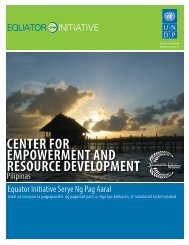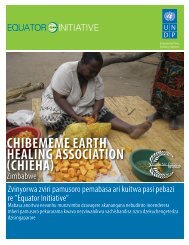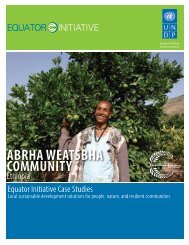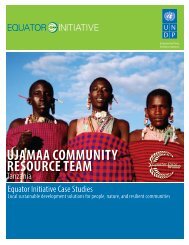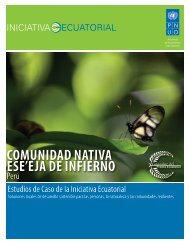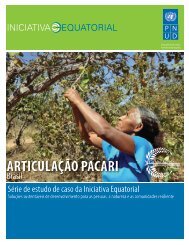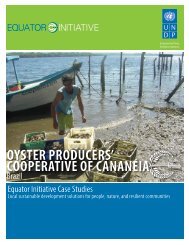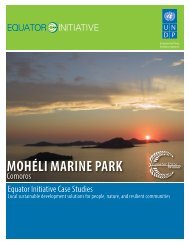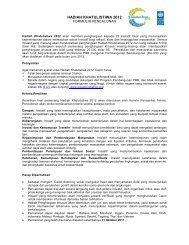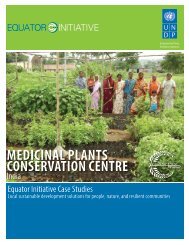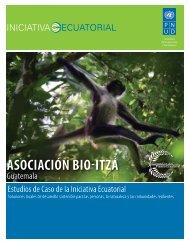KERALA KANI COMMUNITY WELFARE TRUST - Equator Initiative
KERALA KANI COMMUNITY WELFARE TRUST - Equator Initiative
KERALA KANI COMMUNITY WELFARE TRUST - Equator Initiative
Create successful ePaper yourself
Turn your PDF publications into a flip-book with our unique Google optimized e-Paper software.
<strong>KERALA</strong> <strong>KANI</strong> <strong>COMMUNITY</strong><br />
<strong>WELFARE</strong> <strong>TRUST</strong><br />
Empowered lives.<br />
Resilient nations.<br />
India<br />
<strong>Equator</strong> <strong>Initiative</strong> Case Studies<br />
Local sustainable development solutions for people, nature, and resilient communities
UNDP EQUATOR INITIATIVE CASE STUDY SERIES<br />
Local and indigenous communities across the world are advancing innovative sustainable development solutions that work<br />
for people and for nature. Few publications or case studies tell the full story of how such initiatives evolve, the breadth of<br />
their impacts, or how they change over time. Fewer still have undertaken to tell these stories with community practitioners<br />
themselves guiding the narrative.<br />
To mark its 10-year anniversary, the <strong>Equator</strong> <strong>Initiative</strong> aims to fill this gap. The following case study is one in a growing series<br />
that details the work of <strong>Equator</strong> Prize winners – vetted and peer-reviewed best practices in community-based environmental<br />
conservation and sustainable livelihoods. These cases are intended to inspire the policy dialogue needed to take local success<br />
to scale, to improve the global knowledge base on local environment and development solutions, and to serve as models for<br />
replication. Case studies are best viewed and understood with reference to ‘The Power of Local Action: Lessons from 10 Years of<br />
the <strong>Equator</strong> Prize’, a compendium of lessons learned and policy guidance that draws from the case material.<br />
Click on the map to visit the <strong>Equator</strong> <strong>Initiative</strong>’s searchable case study database.<br />
Editors<br />
Editor-in-Chief: Joseph Corcoran<br />
Managing Editor: Oliver Hughes<br />
Contributing Editors: Dearbhla Keegan, Matthew Konsa, Erin Lewis, Whitney Wilding<br />
Contributing Writers<br />
Edayatu Abieodun Lamptey, Erin Atwell, Toni Blackman, Jonathan Clay, Joseph Corcoran, Larissa Currado, Sarah Gordon, Oliver Hughes,<br />
Wen-Juan Jiang, Sonal Kanabar, Dearbhla Keegan, Matthew Konsa, Rachael Lader, Patrick Lee, Erin Lewis, Jona Liebl, Mengning Ma,<br />
Mary McGraw, Gabriele Orlandi, Juliana Quaresma, Peter Schecter, Martin Sommerschuh, Whitney Wilding, Luna Wu<br />
Design<br />
Oliver Hughes, Dearbhla Keegan, Matthew Konsa, Kimberly Koserowski, Erin Lewis<br />
Acknowledgements<br />
The <strong>Equator</strong> <strong>Initiative</strong> acknowledges with gratitude the Kerala Kani Community Welfare Trust. Photo credits courtesy of Tropical Botanical<br />
Garden and Research Institute and Alosh Bennett, via flickr. Maps courtesy of CIA World Factbook and Wikipedia.<br />
Suggested Citation<br />
United Nations Development Programme. 2012. Kerala Kani Community Welfare Trust, India. <strong>Equator</strong> <strong>Initiative</strong> Case Study Series. New York,<br />
NY.
<strong>KERALA</strong> <strong>KANI</strong> <strong>COMMUNITY</strong> <strong>WELFARE</strong><br />
<strong>TRUST</strong><br />
India<br />
PROJECT SUMMARY<br />
The Kerala Kani Community Welfare Trust is the result of an<br />
innovative partnership between a community of the indigenous<br />
Kani people, based in the Western Ghats, Kerala, and a private<br />
institute that has developed a medicinal product using local<br />
genetic resources and traditional knowledge. The discovery of the<br />
medicinal qualities of the Arogyapacha plant (Trichopus zeylanicus)<br />
was based on its local use for its anti-fatigue properties.<br />
A long process of phytochemical, ethno-pharmacological and<br />
toxicological research by a local research institute led to the<br />
development of a herbal formulation for use in the production of<br />
a licensed herbal drug called ‘Jeevani’. Revenues from the license<br />
to manufacture the drug and royalties from its sale have been<br />
divided between the institute and the Kani community; these<br />
funds formed the basis of the trust, established in 1997 to oversee<br />
their reinvestment in community welfare projects.<br />
TABLE OF CONTENTS<br />
Background and Context 4<br />
Impacts 5<br />
3<br />
KEY FACTS<br />
EQUATOR PRIZE WINNER: 2002<br />
FOUNDED: 1997<br />
LOCATION: Western Ghats, Kerala<br />
BENEFICIARIES: Indigenous Kani tribe<br />
BIODIVERSITY: Trichopus zeylanicus
Background and Context<br />
India’s indigenous Kani tribe comprises traditionally nomadic communities<br />
that have settled in the forests of the Agasthyamalai hills of<br />
the Western Ghats, in the Thiruvananthapuram district of Kerala. This<br />
area falls within the Agasthyamalai Biosphere Reserve, established<br />
in 2001, which covers 3,500km2 of moist deciduous forests, montane<br />
rain forests and shola forest in the Western Ghats. It is habitat<br />
to more than 2,000 varieties of medicinal plants, of which at least<br />
50 are rare and endangered species. Rare animals include the tiger,<br />
Asian Elephant, and the Nilgiri Tahr, an endangered Ibex endemic to<br />
Kerala and Tamil Nadu.<br />
The Kani tribe of the Western Ghats<br />
The Kani tribe’s traditional occupations include the production of<br />
handicrafts such as baskets, mats, and cane works, seasonal collection<br />
of minor forest products such as honey and beeswax, and cultivation<br />
of edible plants such as tapioca, banana, millets and cash<br />
crops such as pepper, coconut, rubber, Areca nut, and cashew nut.<br />
The traditional structure of the community was that of a highly coordinated<br />
unit under the control of a tribal chief, called the Moottukani.<br />
Traditionally the Moottukani combined the roles of the law<br />
giver, protector and dispenser of justice, physician and priest. Over<br />
time, however, this traditional system of governance was replaced<br />
to a large extent by the Panchayati Raj system of devolved village<br />
administration. Today, the Kanis live in several tribal hamlets, each<br />
consisting of 10 to 20 families disbursed in and around the forest<br />
areas of Thiruvananthapuram district.<br />
A local miracle cure: Arogyapacha<br />
In the late 1980s, this tribe received international attention for<br />
their traditional use of a unique medicinal plant. The tribe had long<br />
known of the anti-fatigue properties of the Arogyapacha plant<br />
(Trichopus zeylanicus), eaten by tribe members during long treks in<br />
the hilly Western Ghats region. Traditional knowledge of the use of<br />
local medicinal plants was passed from generation to generation<br />
by tribal healers. In December 1987, a team of scientists from the<br />
Tropical Botanical Garden and Research Institute, a centre for plant<br />
research in Kerala, undertook a botanical field survey into the forests<br />
of the Western Ghats, accompanied by men from the local Kani tribe.<br />
They observed the men eating fruits which kept them energetic and<br />
agile; the team were later offered these Arogyapacha fruits during<br />
arduous trekking and found that they gave them renewed energy<br />
and strength.<br />
Trichopus zeylanicus is a small, rhizomatous, perennial herb distributed<br />
in Sri Lanka, Southern India and Malaysia. Found in lowland<br />
sandy forests near streams in Sri Lanka and in low-lying forests in<br />
the Malay Peninsula, in India it grows at an altitude of around 1,000<br />
metres. The subspecies found in India is called trichopus zeylanicus<br />
travancoricus, and is endemic to the Western Ghats. Scientific investigations<br />
on the plant were carried out at the Tropical Botanic Garden<br />
and Research Institute, revealing that the plant had anti-stress and<br />
4<br />
anti-fatigue properties, and could benefit the liver and the immune<br />
system. After seven years of phytochemical, ethno-pharmacological<br />
and toxicological research, twelve active compounds had been isolated<br />
and used to produce a standardised herbal formulation. This<br />
was used in the production of a licensed herbal drug called “Jeevani”,<br />
with the profits shared equally between the research institute and<br />
the Kani tribe. License to manufacture the drug was subsequently<br />
sold to Arya Vaidya Pharmacy, a private limited company, for an initial<br />
period of seven years. The license fee – one million rupees, or<br />
approximately USD 50,000 – was split equally between the research<br />
institute and the Kanis, who also received an equal share of the two<br />
per cent royalty received from sales.<br />
Access and benefit-sharing in practice<br />
Knowledge of the plant’s medicinal properties was shared by many<br />
Kani groups living around Thiruvananthapuram, however, while the<br />
benefit-sharing arrangement agreed only included one Kani tribal<br />
group. This led to protests from other groups, and initially delayed<br />
the full distribution of monetary benefits. As a means of solving this<br />
problem and involving the wider Kani community, in 1997 the Kerala<br />
Kani Samudaya Kshema Trust was created (Samudaya means “community”;<br />
Kshema means “welfare”.) This was comprised of a general<br />
body with adult tribal members chosen from 30 Kani settlements,<br />
an executive committee representing all of the tribal colonies, and<br />
a fourteen-member governing council. The aim of the trust was to<br />
ensure that the benefits from sales of the Jeevani drug would be equitably<br />
shared within the Kani community. To this end, the capital<br />
amount was held in a fixed bank deposit, with the interest accruing<br />
used for various community development programmes.<br />
Welfare programmes planned and implemented by the Kani trust<br />
have included an insurance scheme for pregnant women and to<br />
cover accidental deaths, and in providing financial support to poorer<br />
Kani households for education and marriage purposes. The model<br />
has benefitted over 16,000 Kani people, comprising over seven hundred<br />
families.
Impacts<br />
Sustainable cultivation of Arogyapacha<br />
A scheme was also put in place to sustainably harvest the Arogyapacha<br />
plant in its natural habitat, using local labour from the Kani tribe.<br />
To prevent overexploitation of the plant for commercial gain, a system<br />
was devised in conjunction with the Kerala Forest Department<br />
that paid Kani households to cultivate the plant and sell the leaves<br />
to the Tropical Botanic Garden and Research Institute. This ensured<br />
the sustainable use of the natural resource, while the sale of leaves<br />
would also give the Kanis an extra source of income.<br />
A pilot scheme for cultivation of the plant was carried out with support<br />
from India’s Integrated Tribal Development Programme in areas<br />
surrounding the reserved forests from 1994 to 1996. Under this programme,<br />
fifty families were given around Rs. 2,000 (USD 40) each<br />
for cultivating the plant. The Tropical Botanic Garden and Research<br />
Institute purchased five tonnes of these leaves per month from the<br />
families and supplied them to Arya Vaidya Pharmacy for production<br />
of Jeevani. Through this scheme, roughly half the Kanis secured employment<br />
and were trained on in-situ cultivation and harvesting of<br />
Arogyapacha to ensure that the plants were not over-harvested. This<br />
has been complemented by ex-situ cultivation conducted by the<br />
Tropical Botanic Garden and Research Institute, ensuring that this<br />
medicinal plant has been sustainably conserved.<br />
A case study for Article 8(j)<br />
This benefit-sharing agreement gained international recognition as<br />
an example of equitably sharing the benefits arising from the sustainable<br />
use of genetic resources, one of the three objectives of the<br />
Convention on Biological Diversity (CBD).<br />
Article 8(j) of the Convention on Biological Diversity (CBD):<br />
“Each contracting Party shall, as far as possible and as appropriate:<br />
Subject to national legislation, respect, preserve and maintain knowledge, innovations and practices<br />
of indigenous and local communities embodying traditional lifestyles relevant for the conservation<br />
and sustainable use of biological diversity and promote their wider application with the approval and<br />
involvement of the holders of such knowledge, innovations and practices and encourage the equitable<br />
sharing of the benefits arising from the utilization of such knowledge innovations and practices.”<br />
Source: CBD, www.cbd.int/traditional<br />
5<br />
The Kerala Kani Samudaya Kshema Trust is a case study of an access<br />
and benefit-sharing regime at the local level, and has demonstrated<br />
both the challenges to implementation of this idea, and its potential<br />
to positively impact local communities.<br />
The lack of one cohesive Kani “community” has meant that there<br />
is still little uniformity in Kanis’ perceptions of the benefit-sharing<br />
agreement. Tribal groups in different areas of Thiruvanathapuram<br />
district, even at distances of around 15 to 20 km from each other,<br />
were found to have differing opinions on the role of the Tropical<br />
Botanic Garden and Research Institute in the late 1990s. There<br />
were complaints from the Vithura and Peringamala Panchayat areas,<br />
where tribal groups claimed to have been under-represented<br />
in dealings with the research institute. It has also been claimed that<br />
monetary benefits have been slow to reach community members,<br />
while lack of transparency in the running of the trust and bureaucratic<br />
obstructions have hampered its effectiveness.<br />
Various measures have been proposed to refine the benefit-sharing<br />
model and future replications. These include ensuring that the prior<br />
informed consent of all relevant local and indigenous community<br />
members is obtained for access to biological resources on their<br />
lands and use of their traditional knowledge. Other recommendations<br />
have covered the scope of the material being accessed, including<br />
derivatives obtained from it, and their intended use. While the<br />
Kerala Kani Samudaya Kshema Trust remains an experiment in its access<br />
and benefit-sharing provisions, it still represents one of the only<br />
examples to date of an indigenous tribe benefitting from the use<br />
of their genetic resources and traditional knowledge, bringing substantial<br />
conservation and socioeconomic benefits to the Kani tribe<br />
and their natural heritage.
FURTHER REFERENCE<br />
• Gupta, A. K. 2002. Value addition to local Kani tribal knowledge: patenting, licensing and benefit-sharing. World Intellectual Property<br />
Organization - United Nations Environment Programme. Download here.<br />
• Anuradha, R. V. 1998. Sharing With the Kanis: A Case Study from Kerala, India. Secretariat of the Convention on Biological Diversity,<br />
Montreal. Download here.<br />
Click the thumbnails below to read more case studies like this:<br />
<strong>Equator</strong> <strong>Initiative</strong><br />
Environment and Energy Group<br />
United Nations Development Programme (UNDP)<br />
304 East 45th Street, 6th Floor<br />
New York, NY 10017<br />
Tel: +1 212 906-6691<br />
Fax: +1 212 906-6642<br />
www.equatorinitiative.org<br />
The United Nations Development Programme (UNDP) is the UN’s global development network, advocating for change and connecting<br />
countries to knowledge, experience and resources to help people build a better life.<br />
The <strong>Equator</strong> <strong>Initiative</strong> brings together the United Nations, governments, civil society, businesses and grassroots organizations<br />
to recognize and advance local sustainable development solutions for people, nature and resilient communities.<br />
©2012 by <strong>Equator</strong> <strong>Initiative</strong><br />
All rights reserved



